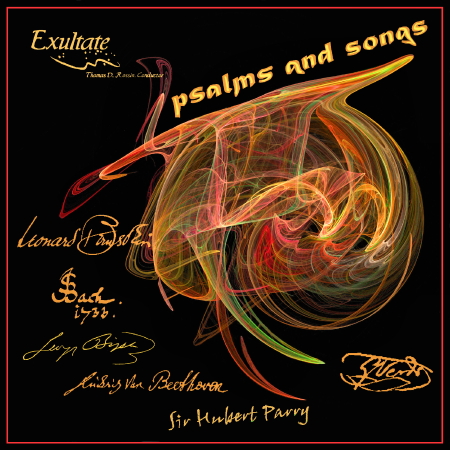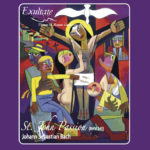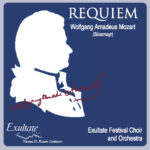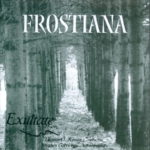Psalms and Songs
$15.00
Bach and Bernstein gems…touching and beautiful…plus a surprise!
Description
CHICHESTER PSALMS – Leonard Bernstein:
I. Psalm 108:2; Psalm 100
II. Psalm 23; Psalm 2:1-4 (Jake Ingbar, boy soprano)
III. Psalm 131; Psalm 133:
Singet dem Herrn (BWV 225) – Johann Sebastian Bach
Singet – Mov.1
Singet – Mov. 2
Singet – Mov. 3
Other Works:
I Was Glad When They Said Unto Me – Sir Hubert Parry
Anvil Chorus (Il Trovatore) – Giuseppi Verdi
Witches’ Chorus (Macbeth) – Giuseppi Verdi
Prisoners’ Chorus (Fidelio) – Ludwig van Beethoven
March of the Toreadors Carmen) – Georges Bizet
The people of Israel were also people of music, and the Scriptures are filled with accounts of them singing, dancing, and playing musical instruments in praise of the Lord. Their Psalms have been passed down to us over the centuries as a sacred songbook, sung anew in each generation through the genius of great composers from Bach to Bernstein.
Chichester Psalms – Leonard Bernstein
When the Dean of Chichester Cathedral commissioned Leonard Bernstein to compose a sacred choral work, he added to his request that “a touch of West Side Story would be welcomed.” Bernstein took that suggestion literally, creating the new commission from music he had originally composed for a discarded version of his popular musical. In that version the star-crossed lovers were a Jewish girl and a Roman Catholic boy, with musical themes springing from Bernstein’s Jewish heritage. He adapted these themes into three psalm settings for choir, full orchestra, and a boy soprano, to be sung in Hebrew. Particularly striking is the central setting of Psalm 23, The Lord is My Shepherd, where the boy soprano provides the voice of David, the shepherd boy and psalmist. Bernstein himself conducted the premiere of Chichester Psalms at Philharmonic Hall in New York early in 1965 before the work was performed at Chichester Cathedral in July.
Jake Ingbar, boy soprano
Jake Ingbar, currently in eighth grade, recorded Chichester Psalms with Exultate when he was in the sixth grade. He has studied cello since he was four, began piano at age five and most recently is in classical voice training with Elizabeth Mannion at the Institute of Vocal Artistry in St Paul, Minnesota. He also has studied opera in Italy with La Musica Lirica. He performed the Vivaldi Double Cello Concerto as a soloist with the St. Paul Chamber Orchestra at age 9 and has been on stage with the Guthrie Theater, Children’s Theater Company, Theater Latte Da, Ordway Theater, Chanhassen Dinner Theater, Walking Shadow Theater Company and, of course, Exultate. In his free time, Jake enjoys spending time with his school friends and finding time for tap dancing. His dream is to continue with his musical training, theater and dance, pursuing a professional career in the performing arts.
Singet dem Herrn (BWV 225) – Johann Sebastian Bach
In the margin of his personal Bible next to Exodus 15:20, Bach wrote the words Festival prelude for two choirs to be sung to the glory of God. This notation can only refer to Singet dem Herrn ein neues Lied, a joyful double motet setting texts from the psalms with additional words most likely provided by Bach himself. The opening setting of Psalm 149 captures perfectly the joyful song of the Israelites celebrating their escape from Egyptian captivity as described in the Exodus text. The contrasting second movement, using a stanza from the familiar Lutheran chorale Nun lob,’ mein Seel, den Herren, implores God to provide the same fatherly protection for all believers. A joyous antiphonal setting of a verse from Psalm 150 follows, culminating in a dazzling fugue where the two choirs join together to proclaim, “Let everything that breathes, praise the Lord.”
I Was Glad When They Said Unto Me – Sir Hubert Parry
These verses from Psalm 122 are traditionally sung at the coronation of British monarchs. Sir Hubert Parry, Director of the Royal College of Music, originally composed this splendid setting in 1902 for the coronation of King Edward VII. He added the stirring organ introduction for the coronation of Edward’s son, King George V, in 1911.
A group of sixteenth century intellectuals in Florence determined through their studies of Greek drama that the ancient tragedies had not been spoken, but sung. In returning to that tradition they created a new art form combining poetry with music and drama. Considering such works too grand to be called a single opus, they named their new art form with the plural of opus: Opera!
Anvil Chorus (Il Trovatore) – Giuseppi Verdi
Giuseppe Verdi began his study of the organ at age seven and might well have spent his career as a church musician, had he not been passed over for the position of maestro de capella in Monza as a young man. He turned instead to the stage to become the leading Italian composer of his day, despite the tragic loss of his wife and children to a sudden illness. He composed 209 operas including Il Trovatore which premiered in Rome in January, 1853. The Anvil Chorus introduces the second act of the opera where the gypsies sing about flowing wine and beautiful women to the rhythm of striking their anvils.
Witches’ Chorus (Macbeth) – Giuseppi Verdi
Verdi once wrote of Shakespeare, “He is one of my favorite poets. I have had him in my hands from my earliest youth, and I read and re-read him continually.” It is no surprise, then, that Verdi composed operas based on three of Shakespeare’s plays. For his 1865 revival ofMacbeth in Paris, he enlarged the Bard’s trio of witches into a full women’s choir and added this delightful chorus for them to sing. Afraid that the ladies of the opera might sing too melodiously for the scene, Verdi added a cautionary note at the first soprano entrance in the score: “Don’t forget that these are witches who are speaking!”
Prisoners’ Chorus (Fidelio) – Ludwig van Beethoven
Beethoven considered opera to be the highest form of art. Despite his considerable success composing piano sonatas, chamber works and symphonies, he didn’t consider himself ready to attempt an opera until his mid 30s. He accepted a commission from the Viennese Opera in 1803 but requested a change in libretto, choosing to create a German version of the French opera Leonore, which he called Fidelio. The opera went through several revisions before the final version met with popular acclaim in 1814. The Prisoners’ Chorus, where the falsely imprisoned Florestan and his fellow inmates sing of hope despite their captivity, is often considered the emotional center of the opera. Not long before his death Beethoven said ofFidelio, “This infant of my spirit was born in far more agonizing torment than any othersÉThat is why it is dearer to me and, more than any other, it deserves to be preserved and used for the learning of the arts.”
March of the Toreadores (Carmen) – Georges Bizet
Georges Bizet wrote music at the age of four, entered the Paris Conservatory at age nine, and won the Prix de Rome for his operetta Le Docteur Miracle at age nineteen. Once the glow of this early success wore off, Bizet struggled to satisfy popular taste and lost confidence in his ability to compose. Carmen, completed in 1875, proved too dramatic for Parisian audiences. Bizet died at the age of 37, only three months after the opera’s failed premiere. Shortly after his untimely death Carmen became a huge success, hailed by critics as the beginning of theverismo style in opera. The famous March of the Toreadors comes at the beginning of Act IV as the crowd cheers for the bullfighters on their way to the arena.
Program Notes – Yvonne Grover
You must be logged in to post a review.
This site uses Akismet to reduce spam. Learn how your comment data is processed.






Reviews
There are no reviews yet.